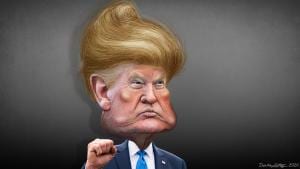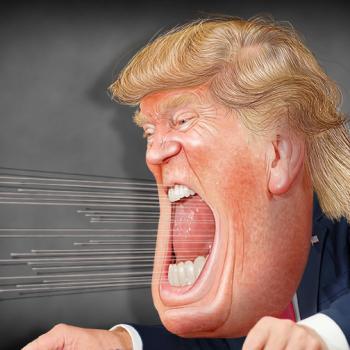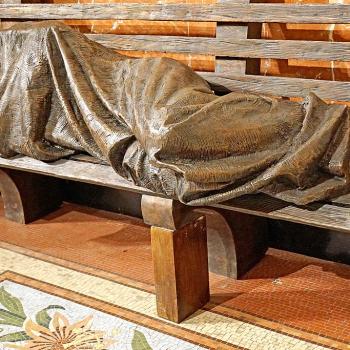
In his first debate with Biden, Trump was asked if he were willing to condemn white supremacists. Trump, acting as if he were willing, asked for a name of a white supremacist group which he could condemn. Biden, it could be heard, answered by saying Proud Boys. In response, Trump said, “Proud Boys, stand back and stand by.”
That was the extent of Trump’s “condemnation.” That is, Trump was unwilling to condemn them. All he was wiling to do was tell them to stand down and be ready – but what are they to be ready for? Trump’s own narrative suggests he promotes unrest during and after the election, unrest which will come from the chaos he has himself brought about by questioning the election even before it began.
The Proud Boys, a violent, racist group, did not receive Trump’s words as a condemnation, but rather, his support. They are “standing by.” This is not surprising, because the Proud Boys consistently found themselves standing by members of the Trump Administration and loved by Republic politicians.[1] Proud Boys are violent, and that violence has often led to many members being arrested. They have a history of causing chaos. If Trump wanted to condemn violence, if he wanted to condemn the chaos on the streets, he would not have told them to stand by; instead, he made it clear, he is ready to use them if he needs to and their response to him is that they are there for him.
It should not be difficult for any right-thinking, sane person to condemn racism, and with it, white supremacy. It doesn’t take much to do so. There should be no ambiguity, no question about the condemnation. Trump was unable to do so.
Racism is a sin, an intrinsic evil. It is a non-negotiable. How racism is to be fought might be in question, but racism itself is unacceptable and cannot and must not be coddled. It represents a direct, unmistakable attack on the dignity of the human person, and so an attack on God who can and should be seen imagined in every human person. The universal love we must have for our neighbor is lost, and so the two great commandments are rejected at the same time, as Pope St. John Paul II explained happened with social sins:
Some sins, however, by their very matter constitute a direct attack on one’s neighbor and more exactly, in the language of the Gospel, against one’s brother or sister. They are an offense against God because they are offenses against one’s neighbor. These sins are usually called social sins, and this is the second meaning of the term. In this sense social sin is sin against love of neighbor, and in the law of Christ it is all the more serious in that it involves the Second Commandment, which is “like unto the first.”[2]
Racism is not something to be treated lightly. The more it is accepted, or at least coddled, by society, the greater society will have to face the consequences of its social sin. The violence which comes in its wake is due to the fact that society has allowed racism to thrive. If should not be surprising that someone would defend themselves from the violent assaults against the dignity of their person as a result of unchecked racism, and if someone does, it should not be used to try to make it appear like racists and their victims are equally violent, equally sinful. They are not. Racism is the root cause of the problem, and it is violent by its very nature. Victims, on the other hand, seek peace, and only when it is not allowed, only when their human dignity is violated by an extended amount of time, do they respond in desperation: there is no comparison of the two. Thus, what Pope St. Paul VI explained years ago remains true today:
Racial discrimination possesses at the moment a character of very great relevance by reason of the tension which it stirs up both within countries and on the international level. Men rightly consider unjustifiable and reject as inadmissible the tendency to maintain or introduce legislation or behavior systematically inspired by racialist prejudice. The members of mankind share the same basic rights and duties, as well as the same supernatural destiny. Within a country which belongs to each one, all should be equal before the law, find equal admittance to economic, cultural, civic and social life and benefit from a fair sharing of the nation’s riches. [3]
Racists do not like being challenged. They like claiming anyone who stands up to them, anyone who tries to fix the problems created by racism, as being like them, that is, as being racist. They see all things in relation to power and control. Instead of seeing humanity as one, they see it divided into different racial groups which are at war with each other. They want to maintain the power and control of their own race over others, and so will resist, often with violence, those who seek a more just society because such a society will not allow them to oppress people of other races. The US Catholic Bishops, in their 1979 letter on racism, Brothers and Sisters to Us, indicated how racists resent programs which aim to correct the problems of racism, and they use that resentment to stir discontent against such programs of social justice:
Finally, racism is sometimes apparent in the growing sentiment that too much is being given to racial minorities by way of affirmative action programs or allocations to redress long-standing imbalances in minority representation and government-funded programs for the disadvantaged. At times, protestations claiming that all persons should be treated equally reflect the desire to maintain a status quo that favors one race and social group at the expense of the poor and the nonwhite. [4]
This is exactly what we see Trump himself did when he forbade anti-racist training in federal agencies. He called diversity training as “anti-American.” This should make us wonder who he considers to be American, that is, who it is he stands to protect and defend as the President of the Untied States. His actions, which speak louder than words, indicate very well he does not view all Americans equally, and he only promotes and defends as Americans those who hold his own ideologies.
Trump, far from denouncing the Proud Boys, far from standing strong against racism, has a history of supporting white supremacy, a history which one can see spans decades. It’s not just people of color who are affected by it. Anti-Semitism has been fueled by the Trump Administration and the Republicans who back him. Islamophobia, likewise, is easily discerned in Trump’s actions and rhetoric. Catholics, indeed, Christians, following the Gospel must not accept any of this. For, as Vatican II declared, all such racism must be fought against and overcome:
True, all men are not alike from the point of view of varying physical power and the diversity of intellectual and moral resources. Nevertheless, with respect to the fundamental rights of the person, every type of discrimination, whether social or cultural, whether based on sex, race, color, social condition, language or religion, is to be overcome and eradicated as contrary to God’s intent. For in truth it must still be regretted that fundamental personal rights are still not being universally honored.[5]
Trump was not willing to denounce the Proud Boys. We should all hear his words clearly. With the racism coming out of the Trump administration, we must know our response is not to stand down, but to resist. We cannot let this racism continue. We cannot let it be normalized once again.
[1] With the Proud Boys being mentioned in the media and on twitter, Trump’s plea that he did not know who they are is not credible. Nonetheless, if one wants to be charitable and assume, somehow, he truly did not know who they were, his response was telling. He could have said something like, “I don’t know who the Proud Boys are, but if they are a white supremacist group, I reject them and what they stand for.” He didn’t. He told them to stand by. That means, if he didn’t know who they were, he was willing to look into them and see how he could put them to use. In either case, his response to the question, and especially in relation to the Proud Boys, suggests that Trump was not willing to condemn white supremacists and instead, was seeking to have them “standing down” for now so that they will be ready if he should need use of them later.
[2] Pope St. John Paul II, Reconciliatio et paenitentia. Vatican translation. . ¶16.
[3] Pope St. Paul VI, Octogesima Adveniens. Vatican translation. ¶16.
[4] U.S. Catholic Bishops, Brothers and Sisters to Us.
[5] Gaudium et spes. Vatican translation. ¶29.
Stay in touch! Like A Little Bit of Nothing on Facebook.
If you liked what you read, please consider sharing it with your friends and family!













